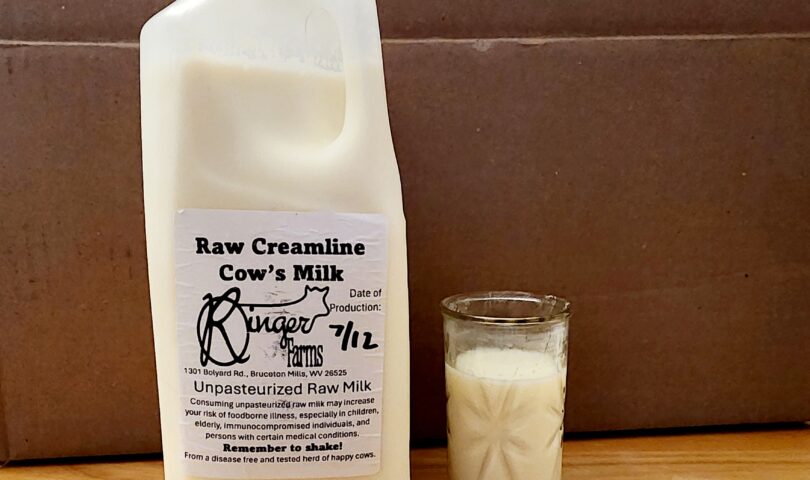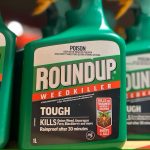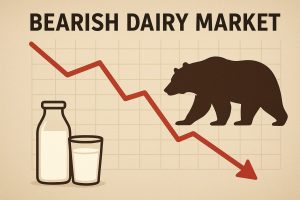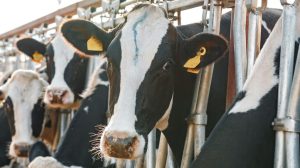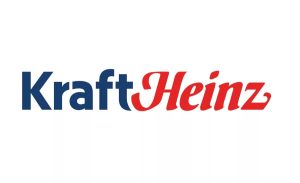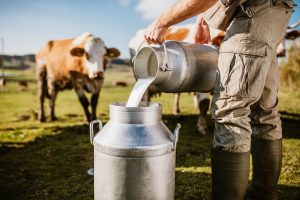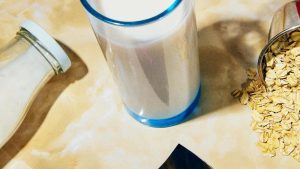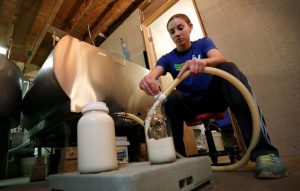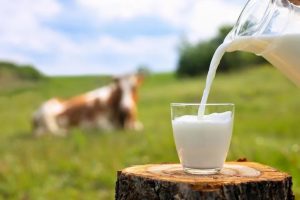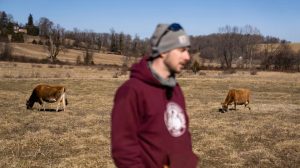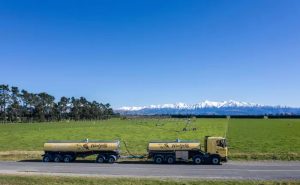
Last week we presented a story with two WVU professors sharing their views on some issues deriving from the state’s new raw milk law: health concerns and the difficulty in obtaining liability insurance.
Ringer Farms in Bruceton Mills is a small producer and seller of raw milk. Co-owner Susan Ringer told us that after the story appeared, some of her customers contacted her, concerned for her farm, and especially about the insurance issue.
So we talked with her on Friday about her farm and about raw milk.
She calls their operation a micro dairy. They milk four Jerseys, which have a higher butterfat content for people who want to skim it for their own butter or cream, or who enjoy the creamier flavor.
It varies, she said, but the cows produce a total of about 16 gallons per day, roughly 112 gallons per week. They use a milking machine.
The four cows are all broke to lead, she said. They observe their own pecking order and milk in the same order every day.
One at a time, she leads them to the milking area. Each cow has its udder cleaned, dipped in iodine and wiped off. A teat cup on each udder seals it so nothing comes in from outside. The milk is drawn and goes into a food-grade milk bucket to be carried directly inside for what she calls “processing ” for lack of a better word.
The processing is fairly simple: It gets filtered and poured into half-gallon jugs. The jugs are lidded and labeled and go into freezer for quick cooling to keep the milk fresh, and then into refrigerator.
They take it to farmers markets or pickup locations in containers packed with ice packs to keep the milk cold.
“My No. 1 consumer is my children, ” she said. They drink more milk than most kids. “Every step of my process is to ensure that I am creating the best product for my children to drink. … I’m not going to cut corners because I know they are the ones who are going to be drinking this first and foremost.”
The steps they take to sanitize the process and keep the milk fresh are important, she said. “I feel like that is something consumers can be confident in, because I am not going to create something dangerous for my children.”
Ringer urges her own cautions for consumers because the law is non-specific and allows only for direct sale (which includes drop-off at vendors for consignment sale) and requires the Department of Agriculture to craft the rules. It says, “Raw milk may be sold by a seller in West Virginia to a consumer in West Virginia.”
The only requirements are for labeling: It must say it’s unpasteurized, provide the production date, give the producer’s name and contact information, and give a warning: “Consuming unpasteurized raw milk may increase your risk of foodborne illness, especially for children, elderly, immunocompromised individuals, and persons with certain medical conditions.”
Ringer said consumers need to to do their research. Talk to the farmer. Ask about their testing, handling practices, cleaning procedures.
Raw milk doesn’t go bad in the same way as pasteurized milk, she said. She advises storing it on the top refrigerator shelf clear in the back, where it’s coldest. It may get to a point where it smells a bit or gets a little yeasty. Then you can skim off the cream, or use the milk as a whole to make cheese. The Ringers make caramel from the whey.
And they are happy to take calls from customers with questions, she said.
Insurance questions Ringer Farms has product insurance, she said, which is a separate policy and covers the milk and the meat they sell.
Progressive Commercial Insurance explains this type of insurance. “Product liability insurance protects you from damage caused by products you manufacture, sell, or distribute. … Product liability insurance covers your business if a customer claims one of your products or services caused harm, illness, or damage to someone else. It includes medical care, legal fees, reimbursement costs, and more. … Insurance for product liability also protects products in a supply chain.”
The new raw milk law took effect in June, and before that it was distributed via herd sharing. People co-owned the cows and paid a boarding fee, Ringer said. The co-owners’ cows produced milk and the Ringers passed it on to them.
Under herd sharing, she said, her farm insurance covered the co-owners shares in the cows and any issues with the milk, apart from any negligence by the farmers.
Under the new law, she said, the farm has a liability. With their product insurance, their insurance company will represent and protect them.
When their customers contacted her with concerns after our initial report, she said, she doubled checked with her insurer, who reassured her they’re covered, and she was able to reassure their customers.
You can now read the most important #news on #eDairyNews #Whatsapp channels!!!
🇺🇸 eDairy News INGLÊS: https://whatsapp.com/channel/0029VaKsjzGDTkJyIN6hcP1K
